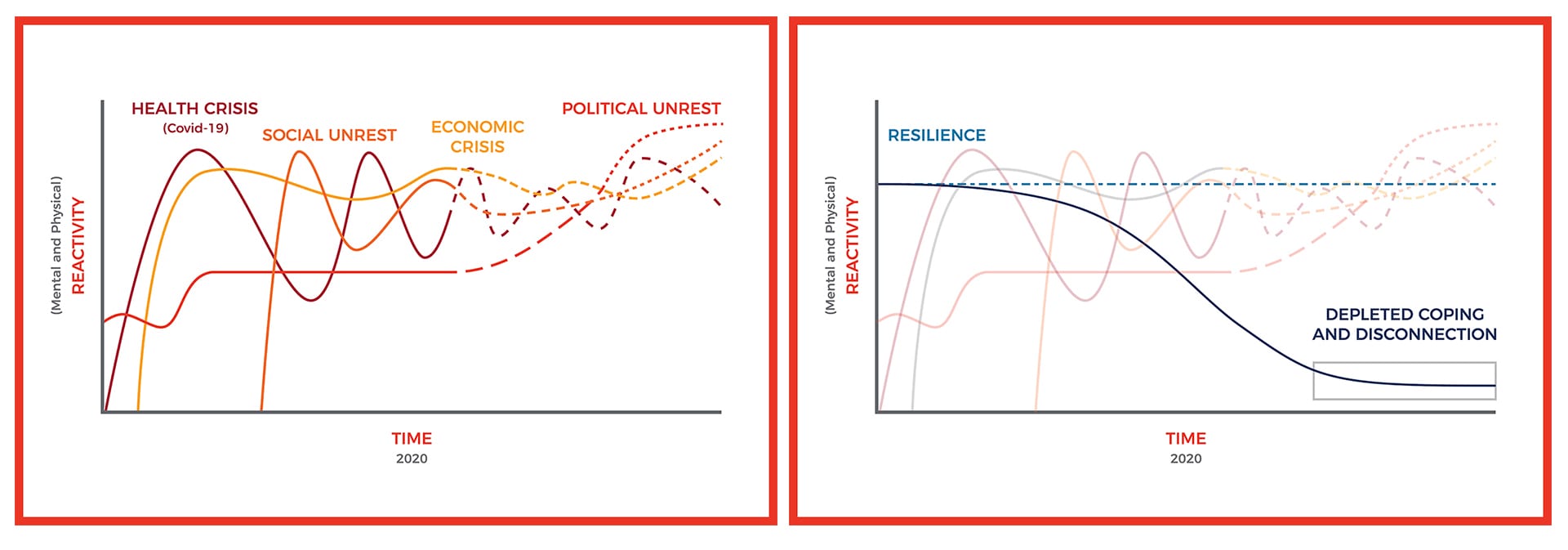
Fostering Resiliency at the Crossroads of Trying Times: A Toolbox for Employee Agility
Lucy Abreu, Employee Engagement and Change Management, Syneos Health
Kathleen Starr, PhD, Managing Director, Behavioral Insights, Syneos Health
To say 2020 has been one of the most trying years in recent memory is an understatement. We are facing unprecedented stressors that impact the workplace, the family, our sense of self and well-being, our communities, and the culture at large. We are not only “sheltering in place,” but consuming a daily diet of stressful news and uncertainty. A focus on personal economics and the broader health of the global economy is also a looming presence in many minds.
Building Employee Resilience
Environmental, social, racial and economic challenges have created a renewed focus on effective employee engagement, ensuring productivity, supporting employee mental and emotional health and finding our collective way in the new normal. This all has measurable and immediate impacts on business such as lowered productivity, absenteeism and presenteeism.
We humans are highly adaptable to our environments, including our ability to deal with long-term stresses. But that skillset – our propensity for resilience – can be depleted. The good news, however, is that resilience can be shored up. Behavioral science shows us that resilience isn’t a personality trait. Instead, it is a skill. Much like a muscle, regular use of our resilience will build its strength.
The Case for Resiliency Communications
re·sil·ience (/rəˈzilyəns/) – the capacity to recover quickly from difficulties; toughness. Noun
– Oxford Dictionary
Resiliency communications relies heavily on two-way communication – listening to employee needs and concerns, eliminating any obstacles you can and, at the least, reflecting back to teams that they are heard, and that you are striving to address all of their concerns.
Further, your organization can help foster a sense of purpose among employees. Helping teams identify the value they bring to the workplace and what direct and indirect impacts they have on the company.
Left: As the 2020 crises waxes and wanes over time, we can expect our employees’ stress responses to follow suit. Right: Ability to cope and be resilient naturally declines over time. Source: Syneos Health
Click on the image to see the full-sized version
Craft a Resiliency Communications Plan
So how do we advance business goals in spite of a displaced workforce? By developing a thoughtful, future-proofing plan you can revitalize your workforce and impart agility in the face of uncertainty and anxiety.
We’ve identified three steps toward revitalization. Keep in mind, your organization’s culture and needs may require different tactics, but the overall framework persists.
- Consider your organization’s specific needs. Think about your company’s style, size and global reach. What training needs do your managers, employees and partners need?
- Commit to transparency. Insofar as your organization will allow legally, regulatorily and culturally, we strongly urge you to shoot straight with your employees. Even if you don’t have an answer for a particular need, open communication about each issue is a best practice.
- Determine the cadence of communications. You may find your organization will thrive on more or less information than another. Depending on your organization’s culture, you may choose to hold a series of one-on-one meetings, invite small groups to virtual fireside chats, or develop a “Caring Colleague” phone tree for employees to make themselves available to colleagues for emotional support.

Address the Person not Just the Employee
Given the ongoing nature of this crisis there is more emphasis now on one-to-one connection. Simply and genuinely asking, “How are you doing?” and being willing to hear a genuine response is an easy way to open up two-way dialogue. From a practical standpoint, consider working with HR to reevaluate any services or resources that employees can access, whether that is your organization’s existing Employee Assistance Program or creating new programs to support employee families. This may include additional personal days, wellness programs, tutoring services for school-at-home challenges or gift matching programs to align with employee commitments to volunteering or social impact campaigns.
Thrive in Healthcare Communications Despite Adversity
For those of us specializing in the healthcare space, we have a unique set of pressures that some other industries may not face. We have seen hurdles to patient access to care and life-saving medicines due to supply chain logistics and regulatory delays. But the industry perseveres, in no small part because patient need is a primary business driver – and a primary motivator for employees who find purpose in their role.
As a healthcare-centric business, we believe the vulnerability and openness that this year has enabled will also make us more empathetic to the struggles of others and will enable us to approach patient and HCP communications needs with even more empathy and authenticity.
So, What’s Next?
Supporting our employees is in the best interest of our business. We owe our colleagues a dignified, authentic response to their rightful concerns about work, life and the state of affairs across the globe. Enacting the three steps to resiliency communications is a head-on way to lead.
If you are ready to create a resiliency communications plan and would like some hands-on direction, Syneos Health is available to co-develop a bespoke strategy for your company.
As we all get ready for what comes next, it’s a good time to think about what lessons and best practices we wish to bring forward into our culture. For example, did virtual coffee chats strengthen collegial relations? Then keep it up even after the return! Conversely, are there practices that are best left in the past? Make those changes. Your organization is dynamic and will benefit from regular self-reflection and adjustment during and after 2020.
To learn more about building employee resiliency in challenging times, read our white paper here.
About the Authors
Lucy Abreu, Senior Vice President
Lucy is a hands-on strategic advisor with over 20 years of experience in developing communication solutions for U.S. and global companies, including large pharmaceuticals to start-up biotechs. As an Employee Engagement and Change Management expert for Syneos Health Communications she specializes in leveraging her multi-disciplinary background in internal and external communications to help clients own their story, especially during times of change, and authentically differentiate themselves in a competitive landscape.
Kathleen Starr, PhD., Change Management and Behavioral Science
Kathleen has more than 20 years of experience in the life science industry. She leads the Behavioral Science practice that focuses on bridging the gap between academic insights in human behavior and commercial applications to drive business success. Kathleen holds a doctorate in Clinical Health Psychology from the University of Miami and completed a post-doctorate fellowship at Duke University Medical Center.
About Syneos Health
Syneos Health® (Nasdaq:SYNH) is the only fully integrated biopharmaceutical solutions organization. The Company, including a Contract Research Organization (CRO) and Contract Commercial Organization (CCO), is purpose-built to accelerate customer performance to address modern market realities. We bring together approximately 24,000 clinical and commercial minds with the ability to support customers in more than 110 countries. Together we share insights, use the latest technologies and apply advanced business practices to speed our customers’ delivery of important therapies to patients. To learn more about how we are Shortening the distance from lab to life®, visit syneoshealth.com.
